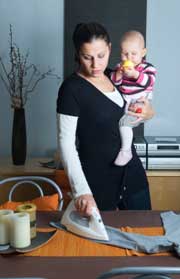22 April 2013
 Australia’s most senior researchers in work and family issues are calling for better support for Australian workers with caring responsibilities.
Australia’s most senior researchers in work and family issues are calling for better support for Australian workers with caring responsibilities.
“A growing body of evidence suggests that Australia is heading for a work and care tsunami,” the co-convenors of the Work + Family Policy Roundtable, Prof Barbara Pocock, Assoc Prof Sarah Charlesworth and Dr Elizabeth Hill said today.
“We are seeing profound changes unfold in the workforce, demographic profile and in households across Australia,” Prof Pocock said.
“More and more workers have caring responsibilities, and these are only going to grow as our population ages.
“While all political parties now support reforms like paid parental leave, major challenges remain.”
Releasing a set of research-based Work, Care and Family Policy Benchmarks the 30 experts on the roundtable from 18 Australian universities called for a new effort to meet the challenges ahead.
Their recommendations include major reforms around childcare to ensure that the quality initiatives of recent years are embedded, properly funded and expanded to meet the growing demand for accessible, quality, flexible and affordable care.
“Australian Governments must increase funding to approved services to enable them to meet the increased wages and other costs associated with providing quality, flexible care,” said co-convenor Dr Elizabeth Hill.
The roundtable also recommended
- Increasing the period of paid parental leave, encouraging employers to top up the Parental Leave Payment to usual earnings, and encouraging fathers to take more parental leave;
- Extending paid holiday and family leave to all workers, including casuals, when they work a full year;
- Improving job security and the predictability of working time for part-time and casual workers with caring responsibilities;
“With more than two million casual workers – more than a fifth of our workforce in Australia and many of them working mothers - it is vital to ensure they have access to the same conditions as ongoing workers such as paid holiday and family leave,” Assoc Prof Charlesworth said.
She said there were basic conditions which were essential for working carers.
- Strengthening the right to request flexible working conditions by publicizing the right, making it available to all workers and providing a right to appeal a refusal;
- Recognising that pay equity is deteriorating in Australia and establishing a Pay Equity Unit to halt the deterioration and ensure real progress;
- Providing more help to sole parents, recognising that the Newstart Allowance is too low to support sole parents with children;
- Reducing the systemic inequality in Australia’s superannuation system which reduces working carers’ retirement incomes and means many will retire with little superannuation – and maintaining the value of the age pension;
- Increasing the capacity of leaders to respond to work, family and care challenges including preventing sexual harassment and discrimination against carers and pregnant women and increasing flexibility to support workers with caring responsibilities.
The convenors said surveys showed that work and family pressures were affecting many households, especially women’s lives.
“Unless these issues are treated as national priorities, then economic growth rests on the backs of stressed, working carers who are increasingly time pressured,” the convenors said.
They said change was needed to ensure a good society, one that enables workforce participation while supporting social and family relations, where work and care can be more easily combined.
“In the long run, productivity is dependent upon social reproduction before all else, making the successful combination of work and family an ongoing national economic – as well as social – goal,” Dr Elizabeth Hill said.
As in the past two elections, the Work + Family Policy Roundtable has published a set of research-based Benchmarks against which election proposals for improving work and care outcomes in Australia can be assessed.
The Roundtable called on all Australian political parties to consider the evidence in favour of change, and to respond to the evidence in support of new policy reforms.
In August the Work + Family Policy Roundtable will publish an evaluation of policy proposals put forward in the context of the forthcoming election, considering them against the Benchmarks.
A copy of the Work + Family Policy Roundtable Benchmarks can be accessed at www.workandfamilypolicyroundtable.org
Further information about the Roundtable is available on the website at www.workandfamilypolicyroundtable.org.
Media contacts:
Prof Barbara Pocock (University of South Australia) 0414 244 606 or Dr Liz Hill (University of Sydney) 0406 919960.
UniSA media unit: Michèle Nardelli mobile 0418823673 email michele.nardelli@unisa.edu.au



